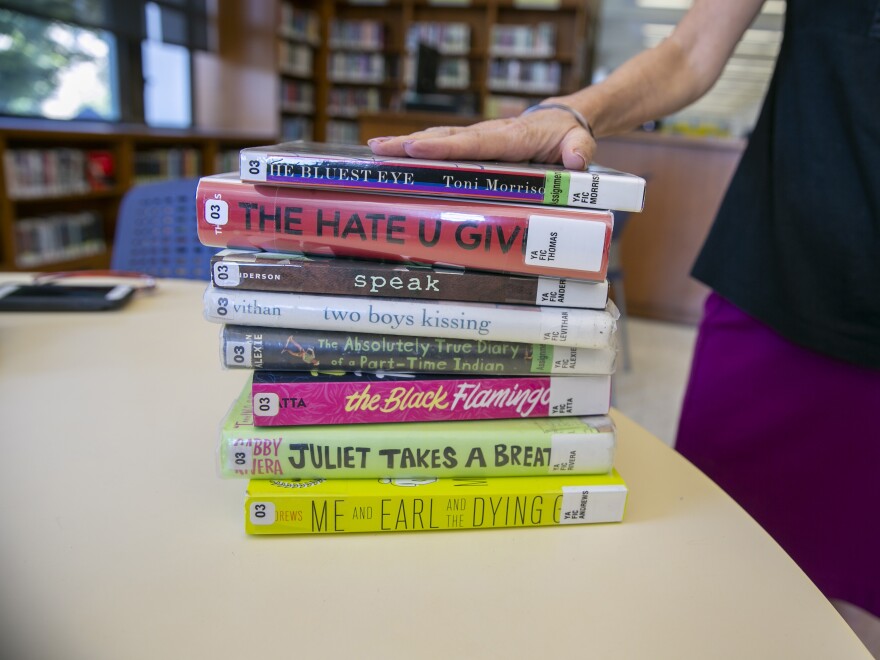Many of the people working to ban books are organized and effective — leading to a new wave of censorship that the American Library Association has called “unprecedented”.
The majority of the books being targeted are by and about LGBTQ people and people of color and Florida schools are at the center of the fight. Now readers in the state are asking how they can push back to keep books on shelves.

One of the first things you see stepping into the African-American Research Library and Cultural Center in Fort Lauderdale is a “book sanctuary” — a collection of books that have been challenged across the country.
Titles like George Orwell’s dystopian classic 1984 are displayed alongside It’s Perfectly Normal, a kid’s sex education book that’s been pulled from Broward public schools.
On a recent evening, there was another stack of controversial books up for grabs too. The library was giving out free copies of A Kid's Book About White Privilege by Ben Sand and A Kid's Book About Systemic Racism by Jordan Thierry.
Maxine Dalen picked up a few copies of each during a visit to the AARLCC with her daughter and niece. She's on a fundraising board for this library.
“As a mom, as … someone who's a leader in the community, I'm going to try to do my best,” Dalen said. “I feel like if everyone does a little something, then we can stop the madness.”
The slim volumes, rated for ages six and up, are part of a series of books that have been targeted. Denise Yoezle got a whole armful of them.
“What do I have here … five?” Yoezle said with a laugh. “We’re hoping for that many grandchildren, believe me.”
Right now, Yoezle says she and her wife have just one grandson. “And I want him to get the full spectrum of this country and what this country is about,” she said.
READ MORE: Broward commissioner voices support for library's banned book ‘sanctuary’

Library director pledges to ‘champion the First Amendment’
The book giveaway — and a panel discussion entitled “Freedom to Read” — were being hosted by Allison Grubbs, who oversees Broward County’s 37 public library branches.
“That's my role as the libraries director, to constantly advocate for freedom to read,” Grubbs said. “It's my role to champion the First Amendment.”
Grubbs caught some flack recently for putting out limited edition library cards emblazoned with the words “I Read Banned Books”.
The county’s only Republican state lawmaker, Rep. Chip LaMarca, pushed back on social media, arguing the library system shouldn't get political.
“This is something they don't teach you really or talk about in library school is that you're going to be a constitutional warrior,” Grubbs said. “And that's a big concept. And it can be scary at times. But it's the right thing to do.”
Librarians are ‘out-organized’ in fight to keep books on the shelves
In the library’s auditorium, about 50 people settled into their seats for the panel discussion.
The panelists on stage were surrounded by two foot-high posters of the cover art for books like Toni Morrison’s The Bluest Eye and Maia Kobabe’s Gender Queer — some of the most banned books in the country, according to a tally by the American Library Association.
Shane Roopnarine says librarians have been overwhelmed by this wave of censorship. He’s the immediate past president of the Florida Library Association.
“It's everywhere. And we just don’t have … the resources to address these challenges,” he acknowledged. “We are kind of being out-organized.”
Days before this event, news broke that a school in neighboring Miami-Dade County had restricted elementary students’ access to a poem recited at President Joe Biden’s inauguration. A parent had claimed Amanda Gorman’s The Hill We Climb was ‘indoctrination’.
“Someone was upset … not surprisingly … about the part of the poem that’s about justice,” said panelist Emily Knox.
Knox is a professor at the University of Illinois Urbana-Champaign and the author of Book Banning in 21st Century America.
The complaint filed against Gorman’s poem claimed it contains ‘indirect hate messages’, citing pages 12 - 13, which read:
We've braved the belly of the beast.
We've learned that quiet isn't always peace,
And the norms and notions of what "just is"
Isn't always justice.
And yet the dawn is ours before we knew it.
Somehow, we do it.
Somehow, we've weathered and witnessed
A nation that isn't broken, but simply
unfinished.
“Justice is something of a trigger word,” Knox said. “CRT, justice, injustice, DEI … these are all words that really are about … decentering white heterosexual male Christian people from being all that we talk about all the time.”

Fight for intellectual freedom dates back to slavery
Tameka Bradley Hobbs is the director of the AARLCC and is a historian by training. She says the fight for intellectual freedom in this country dates back to slavery.
“There were laws on the books … even here in Florida, when it was founded in 1845, that legally prevented Black people from learning to read and write,” she said. “And that was because there was an understanding that literacy and citizenship did go together.”
Grubbs’ last question for the panelists — which was echoed by some audience members — is what readers can do to protect public libraries.
“How do we stand up and fight censorship?” Grubbs asked.
The panel’s advice? Get involved at the local library. And lobby elected officials.
“We must use political power to support intellectual freedom. It’s not just something that is given to us,” Knox said. “We must work for it.”
Copyright 2023 WLRN 91.3 FM. To see more, visit WLRN 91.3 FM.




